An appreciation - Part
1 Welsh gold - Part 2 King Charles -
Part 4 The Italian Job - Part
5 End of an Era
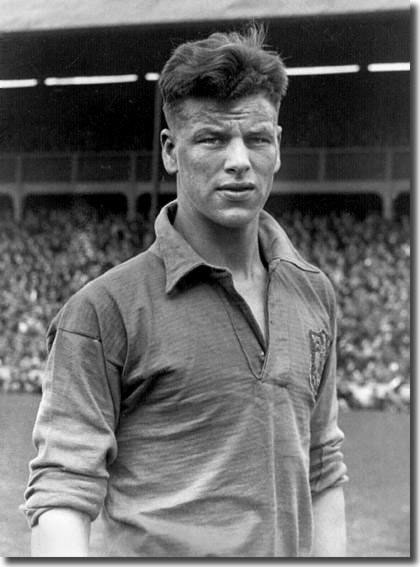 John
Charles broke through into the Leeds United side as a seventeen year old
in 1949 and earned rave reviews for his performance as an ever present
centre half in the team which ended 1949/50
an impressive fifth in the Second Division.
John
Charles broke through into the Leeds United side as a seventeen year old
in 1949 and earned rave reviews for his performance as an ever present
centre half in the team which ended 1949/50
an impressive fifth in the Second Division.
He gained a personal reward for his outstanding form when he was called
up for the Welsh national side towards the end of that season. At 18
years and 71 days old, he became the youngest player every to appear
for his country. It was not until the appearance of Ryan Giggs in 1992
that the record was broken. His debut came in March 1950 when he turned
out in a 0-0 draw against Ireland. It was a depressing day, however.
Beforehand, he had been touted as the Golden Boy of Welsh football,
yet had a curiously lacklustre game and only played once more in the next
three seasons. The Yorkshire Post made no bones about it: 'Charles
was a complete failure ... he was prepared neither to go in and tackle
nor stand off and wait ... he was lost in helpless indecision.'
The truth of the matter is that Charles simply fell apart under the
weight of expectation and nerves. He was playing for his country alongside
players who had been his boyhood heroes, men like Roy Paul, Trevor Ford,
Ronnie Burgess, Alf Sherwood and Wally Barnes and was in awe to be in
their company.
He said of the matter: 'It seemed like only yesterday that I was a starry
eyed youngster on the ground staff at Swansea, proud to look after the
boots of Roy Paul and Trevor Ford. Now I was playing with them in the
same Welsh international team. It was incredible. But I had reckoned without
the footballer's biggest enemy - nerves. My sturdy legs turned to jelly.
My stomach was devoured by a battalion of butterflies. My vision and judgement
were clouded by worry - worry that I would make a mistake.'
It was a rare setback in a meteoric career and the canny old Leeds
United manager, Major Frank Buckley,
wisely built up his young star, convincing him he would get another
chance.
back to top
He did return to the side, but it took a year. He played against Switzerland
in one of a number of games organised to celebrate the Festival of Britain.
Wales went into a 3-0 lead before Charles experienced what he described
as 'the worst 20 minutes of my life'. The Swiss centre-forward and skipper,
Bickel, started to roam around the pitch, causing the youngster problems
he'd not encountered before, and with ten minutes left the score was 3-2.
'From that moment we had to hang on grimly, and we did,' he recalled grimly.
It was a couple of years before the Welsh selectors gambled on Charles
again, having twice gambled and failed with the youngster.
Early in 1952/53 Leeds manager Buckley
had finally seen experiments with using Charles as a forward come very
good and after hitting a couple of goals against Halifax in the West Riding
Senior Cup Final, he became a fixture as the leader of the Leeds attack,
ending the season with 27 goals.
Such form also enabled Charles to force his way back into the international
reckoning after his disastrous first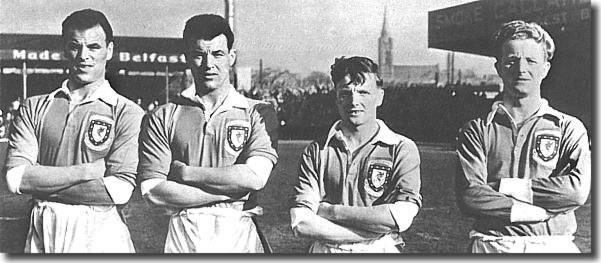 two appearances. He finally made his mark on 15 April 1953 when he played
in Belfast against Northern Ireland.
two appearances. He finally made his mark on 15 April 1953 when he played
in Belfast against Northern Ireland.
The Welsh team had just taken a frightful 5-2 thrashing from England,
but Ray Daniel at centre-half and Trevor Ford at centre-forward were first
choices, so John Charles was drafted in as inside-right.
Danny Blanchflower led his Irish team adroitly and inspired them to
a lead after twenty minutes. The Welsh team of the time, however, was
full of players with skill and fight and fought their way back into
the game. Harry Griffiths, who had travelled to Leeds with Charles from
Swansea but been rejected, was on the left wing and on the half hour
he hooked the ball into the area, allowing Charles to slam a powerful
left foot shot home. Terry Medwin crossed from the right not long afterwards
and Charles headed in his second.
Charles came close to a hat trick, but selflessly set up Trevor Ford
for a third goal. He had done enough, however, to stamp his ability
on the memory of the Welsh selectors, and he was rarely out of the side
after that triumph, spearheading a particularly glorious time in Welsh
footballing history.
Six months later, Wales faced England at Cardiff and gave them a fearsome
run around, despite going down 4-1, and Charles had another supreme game.
Dick Ulyatt, the Yorkshire Post reporter who had enthusiastically
followed the player's glorious development at Elland Road, was gleeful
in celebrating the potential that was finally being realised in a red
jersey: 'All the Sunday newspapers I read yesterday commented that England
were lucky to win. Most of them said that the result was a travesty of
justice, some said this was the worst England side ever selected. All
said that John Charles was the outstanding player. One even said he must
be: "Written down as the greatest and most 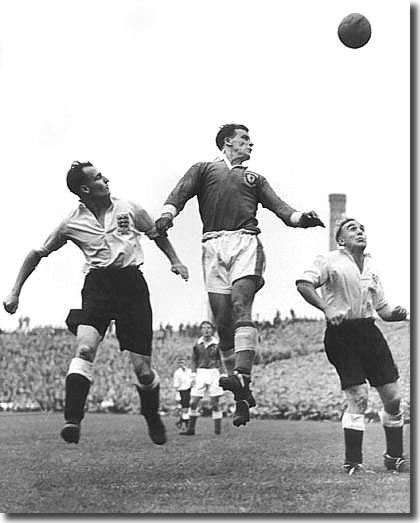 artistically
efficient since Dean led the England attack. If it is insisted, as it
may be, that Lawton was as good as Dean, then Charles must be accounted
better than either."
artistically
efficient since Dean led the England attack. If it is insisted, as it
may be, that Lawton was as good as Dean, then Charles must be accounted
better than either."
'I quote that because for four years I have been saying much the same
of this genial giant who will not be 22 until the end of December and
any further praise from me may be accounted fulsome. I write it with great
satisfaction because when in the spring of 1950 Charles played at centre
half for Wales after I had cracked him up as the best centre half of my
time, he gave such a pathetically feeble exposition that the London critics
looked at me out of pitying and contemptuous eyes. This time I was able
to smile and say: 'I told you so' as they gobbled up all the details I
could give them of the great Charles' career and habits.
'Charles was as magnificent as the few soccer enthusiasts there are in
Leeds know he can be. He beat the sturdy centre-half Johnston nine times
out of ten in the air and nearly as often on the ground.
'A dozen times his headers or shots were either inches wide or saved
by the superb Merrick. He dummied to go to the left, passed to the right
and Davies pushed the ball on for Allchurch to score Wales' goal. He put
two passes at the feet of Davies which ought to have been shot into the
goal instead of high over it. At that stage it was unbelievable Wales
would lose; if it really had been Charles' day he would have scored five
or six goals and made several others.'
Ulyatt continued to be one of Charles' greatest champions and was glowing
in his praise again when Charles made his debut at Wembley in another
game against England in November 1954. The Welshmen were once more in
the ascendancy, but this time saw injuries to a couple of players leave
them vulnerable to an England fightback and a final 3-2 defeat. Roy Bentley
scored all three England goals but Ulyatt had eyes for only one performance:
'His second goal, which was the middle one of three scored in six minutes
during the second half, was an entirely different affair (from the tapped
in first), the ball going squarely to him from the touchline and John
taking it along the penalty area line with such deliberation that I thought
he would lose it. Eventually he transferred it to his right foot and then
cracked in a shot along the ground which had Wood beaten before he could
move.'
back to top
Those two fortunate England victories were avenged in October 1955 when
Wales won 2-1 at Cardiff to record their first victory against their opponents
since before the War. Wales took a two goal lead before Charles headed
in an own goal. He was overjoyed at the result and said of the error:
'Even that couldn't spoil the day. It is a day that will live long in
the memory of every Welshman who saw the match or played in it.'
Ulyatt again covered the match for the Yorkshire Post and was
as positive as ever: 'If there was an outstanding personality in this
game it was the young master - John Charles. He had Lofthouse under his
thumb; his coolness when others about him were losing their heads must
have been an inspiration; his poise as he cut out high centres with his
head left 60,000 Welshmen gasping with admiration. Charles today is the
uncrowned monarch of Welsh football. That he should give England their
goal when he headed a long cross by Byrne into his own net early in the
second half would have been football's greatest irony had it cost Wales
victory.'
Clearly the Fifties was a marvellous period for Wales but it was down
to the spirit and skill of some marvellous individuals who were motivated
and blended well by Manchester United assistant manager Jimmy Murphy,
who worked closely with Matt Busby at Old Trafford. Murphy was a wonderful
asset to the team with his inspirational approach, but the same could
not be said of the rest of the officials who ran the international side.
Few of them had a clue about football or knew the players in the Welsh
side. John Charles recalls the matter well and tells a tale about the
aftermath of a 3-1 defeat by Scotland at Hampden: 'We were sitting in
a lounge having a cup 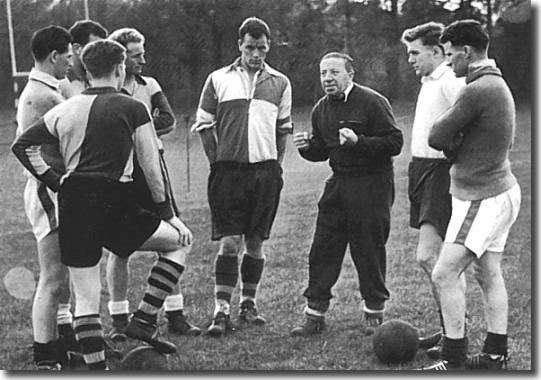 of
tea after the game when one of our selectors came in and said: "Well
done, lads. You were far too strong for us today." We laughed and
said: "But Mr Owens, we're the Welsh team." On another occasion
we were flying off to a match when they found there weren't enough places
on the plane, so the officials all got on and made one of the players
wait for a later flight.'
of
tea after the game when one of our selectors came in and said: "Well
done, lads. You were far too strong for us today." We laughed and
said: "But Mr Owens, we're the Welsh team." On another occasion
we were flying off to a match when they found there weren't enough places
on the plane, so the officials all got on and made one of the players
wait for a later flight.'
The lack of organisation or know how only served to bring the players
closer together and they amazingly managed to make it to the finals
of the 1958 World Cup finals, held in Sweden. They did not do so, however,
without a degree of good fortune.
Wales, strictly speaking, only made it to the finals by default. They
had finished second to Czechoslovakia in their qualifying group. However,
in another qualifying group all of Israel's rivals refused to turn out
against them because of political objections. FIFA decided that the names
of all the group runners up should be put in a hat and one drawn out to
play the Israelis in a two-legged qualification tie. Wales were the lucky
team drawn out and they managed to win both legs 2-0, thus booking their
tickets to the biggest tournament in the world.
By now, of course, John Charles had exchanged the grimy streets of West
Yorkshire for the sunnier aspect of Turin in Italy, following a world
record transfer to Juventus in the close season of 1957.
Having laid out a fortune on their new star performer and seen him come
good almost immediately, the Italian club were understandably reluctant
to run the risk of excursions with Wales leading to injuries. The Welsh
team's management seemed apprehensive and timid about asking the Italians
to release Charles for the tournament and tried to get the player to sort
things out himself.
A stalemate dragged on and on and it was just four days prior to Wales'
opening game in the tournament, with Hungary, before he arrived in Scandinavia
to join his countrymen.
When Charles eventually landed in Stockholm after a badly disrupted flight,
it was the middle of the night and none of his country's representatives
were there to meet him, or even tell him where he needed to go. Charles
struggled helplessly at the airport for over an hour to find out where
he needed to go before a journalist took pity on him and gave him a lift
to the Welsh party's hotel.
However, his eventual arrival at Wales' headquarters brought fresh hope
to his countrymen and lifted everyone's spirits, as his brother Mel Charles
recalled in When Pele Broke Our Hearts by Mario Risoli: 'I'll never
forget it. John walked in. He looked like a Greek god because he was so
tall and bronzed. The selectors saw him, threw down their knives and forks,
stood up and started singing "For he's a jolly good fellow, for he's
a jolly good fellow." It was like a kids' party.'
The warm feelings didn't extend to the Hungarian players whom Wales faced
in their opening group match. They had clearly identified Charles as the
key man in their opponents' line up and set about kicking him out of the
tournament, with no regard as to the fairness of their tactics. They had
not figured, however, with the patience of Charles who steadfastly refused
to rise to their bating. He had the last laugh when he headed home an
equaliser to tie up the game. Hungary had started clear favourites and
had only four years previously been seen as the best side in the world
after their demolition of England and luckless challenge for the World
Cup in Switzerland.
The surprise success led to some complacency in the Welsh ranks for the
next game against an unrated Mexican team. Wales took the lead but allowed
their opponents to equalise a minute from time.
They were not too downheartened by the result, although they were naturally
disappointed. They had to face the hosts Sweden in the decisive final
game. Manager Jimmy Murphy took the view 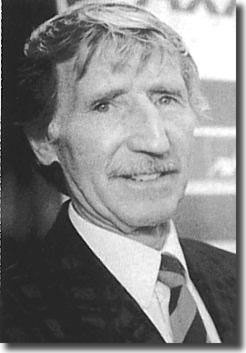 that
a goalless draw would be enough to secure a play off place and set his
tactics for that result, withdrawing Charles first into midfield and later
the defence to stunt the Swedes' attack. It was ruthlessly unattractive
but totally effective in securing the point and indeed Wales did face
a play off with Hungary to go through to the last eight, a totally unexpected
achievement.
that
a goalless draw would be enough to secure a play off place and set his
tactics for that result, withdrawing Charles first into midfield and later
the defence to stunt the Swedes' attack. It was ruthlessly unattractive
but totally effective in securing the point and indeed Wales did face
a play off with Hungary to go through to the last eight, a totally unexpected
achievement.
It was so unexpected, in fact, that it caught the Welsh officials by
surprise - they had been sure that Sweden would beat Wales and had booked
flights home for after the game. They had to fly back from London the
next day after their monstrous gaffe and total lack of faith in an extraordinary
team.
back to top
Charles' devotion to his country's cause had made him only too happy
to play deep against Sweden, but he received an eye injury and had to
have four stitches before the game against the Hungarians who once again
dished out the treatment to him. It was a glorious performance, however,
and Wales came from a goal down to equalise through a 25 yarder from Ivor
Allchurch before Terry Medwin scored the winner. Charles played his part,
but a rough game had put paid to his World Cup. He finished the match
hobbling and was unavailable for the quarter-final against a brilliant
Brazilian side, boasting a bright 17-year-old called Pele among their
forwards.
It was Pele who toe poked home the only goal of the game, his first in
the World Cup finals. The famous Brazilian always referred to the goal
as 'the luckiest and most forgettable goal I ever scored'.
Many felt that it was the absence of Charles which was the deciding factor
and that if he had been fit to play there would have been a completely
different outcome. Tottenham's Welsh winger Cliff Jones: 'We had a very
good team in Wales in those days. John, Ivor Allchurch, with Terry Medwin
and me on the wings, Mel Charles at half back, Jack Kelsey in goal. I
look back at it and think we should have done a lot better than we did.
Individually we were quite as good as any other team but collectively
we couldn't quite put it together. I don't know why.
'I still think if John had played in the quarter final against Brazil,
we could have beaten them. People think I'm joking but I'm convinced of
it. I had my best game of the World Cup in that match, and Terry and I
provided plenty of service with crosses. Colin Webster came in at centre
forward. He was a good player but he was not John Charles. John would
have got on the end of one of those crosses. It's a certainty. And he
would have been very, very dangerous.'
Charles: 'Missing the Brazil match was the biggest disappointment of
my career, but playing for Wales was always very special for me. I always
wanted to pull on the shirt and represent my country. It was an honour.'
Unfortunately, the sad end to his World Cup career also marked the last
major highlight of his international days. He was still good enough to
play for his country for another six years, but neither Wales nor their
centre-forward ever again rose to their 1958 heights on the international
field. But for a time at least, in that golden period, Charles and his
glorious Wales side could as equals rightfully rub shoulders with the
best the world had to offer and not be found wanting. It was the most
wonderful and exciting time in Wales' footballing history.
An appreciation - Part
1 Welsh gold - Part 2 King Charles - Part
4 The Italian Job - Part 5 End of an Era
back to top











 John
Charles broke through into the Leeds United side as a seventeen year old
in 1949 and earned rave reviews for his performance as an ever present
centre half in the team which ended 1949/50
an impressive fifth in the Second Division.
John
Charles broke through into the Leeds United side as a seventeen year old
in 1949 and earned rave reviews for his performance as an ever present
centre half in the team which ended 1949/50
an impressive fifth in the Second Division. two appearances. He finally made his mark on 15 April 1953 when he played
in Belfast against Northern Ireland.
two appearances. He finally made his mark on 15 April 1953 when he played
in Belfast against Northern Ireland. artistically
efficient since Dean led the England attack. If it is insisted, as it
may be, that Lawton was as good as Dean, then Charles must be accounted
better than either."
artistically
efficient since Dean led the England attack. If it is insisted, as it
may be, that Lawton was as good as Dean, then Charles must be accounted
better than either." of
tea after the game when one of our selectors came in and said: "Well
done, lads. You were far too strong for us today." We laughed and
said: "But Mr Owens, we're the Welsh team." On another occasion
we were flying off to a match when they found there weren't enough places
on the plane, so the officials all got on and made one of the players
wait for a later flight.'
of
tea after the game when one of our selectors came in and said: "Well
done, lads. You were far too strong for us today." We laughed and
said: "But Mr Owens, we're the Welsh team." On another occasion
we were flying off to a match when they found there weren't enough places
on the plane, so the officials all got on and made one of the players
wait for a later flight.' that
a goalless draw would be enough to secure a play off place and set his
tactics for that result, withdrawing Charles first into midfield and later
the defence to stunt the Swedes' attack. It was ruthlessly unattractive
but totally effective in securing the point and indeed Wales did face
a play off with Hungary to go through to the last eight, a totally unexpected
achievement.
that
a goalless draw would be enough to secure a play off place and set his
tactics for that result, withdrawing Charles first into midfield and later
the defence to stunt the Swedes' attack. It was ruthlessly unattractive
but totally effective in securing the point and indeed Wales did face
a play off with Hungary to go through to the last eight, a totally unexpected
achievement.